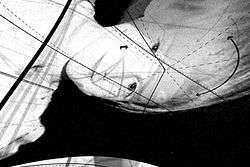Story of Your Life
| "Story of Your Life" | |
|---|---|
|
Illustration for "Story of Your Life" by Hidenori Watanave for S-F Magazine | |
| Author | Ted Chiang |
| Language | English |
| Genre(s) | Science fiction short story |
| Published in | Starlight 2 |
| Publication date | 1998 |
"Story of Your Life" is a science fiction short story by Ted Chiang. It was the winner of the 2000 Nebula Award for Best Novella as well as the 1999 Sturgeon award.[1] The major themes explored by this tale are determinism, language, and the Sapir–Whorf hypothesis. The story was adapted into the 2016 film Arrival.[2]
Plot summary
Dr. Louise Banks is enlisted by the military to communicate with a race of aliens, known as heptapods (due to their 7-pointed radially symmetrical appearance), after they initiate first contact with humanity. The story revolves around Dr. Banks, and woven through it are remembrances of her daughter.
The heptapods have two distinct forms of language. Heptapod A is their spoken language, which is described as having free word order and many levels of center-embedded clauses. Understanding Heptapod B, the written language of the aliens, is central to the plot. Unlike its spoken counterpart, Heptapod B has such complex structure that a single semantic symbol cannot be excluded without changing the entire meaning of a sentence.
When writing in Heptapod B, the writer knows how the sentence will end. The phenomenon of Heptapod B is explained by the aliens' understanding of mathematics and Fermat's principle of least time.
Dr. Banks' understanding of the heptapods' writing system affects the way she perceives time and suggests a deterministic universe where free will is exercised by not affecting the outcome of events. This is reflected by the tense used in the story's writing: a small portion of the story, at the beginning and the end, is written in the present tense, indicating that the story is being written at the time of the daughter's conception. The sections describing the interactions with the Heptapods are written in the past tense. The sections describing the daughter's life—from birth to death and beyond—are written as Dr. Banks' remembrances that she nonetheless describes using the future tense, because learning Heptapod B enables Dr. Banks to know her daughter's entire life even before she agrees to conceive her.
Awards
- Winner of the 2000 Nebula Award for best novella
- Winner of the 1999 Sturgeon Award
- Short listed for the 1999 Tiptree Award
- Ranked 10th on the 1999 Locus poll for best novella
- Nominated for the 1999 Hugo Award for best novella
- Nominated for the 1999 HOMer award for best novella
References
| Wikiquote has quotations related to: Ted Chiang |
- ↑ ""Story of Your Life" by Ted Chiang, Winner, Best Novella in 1999". nebulas.sfwa.org. Retrieved 17 August 2016.
- ↑ Zutter, Natalie (August 8, 2016). "Your First Look at Arrival, the Adaptation of Ted Chiang's Novella Story of Your Life". TOR. tor.com. Retrieved 17 August 2016.
External links
- Story of Your Life title listing at the Internet Speculative Fiction Database
